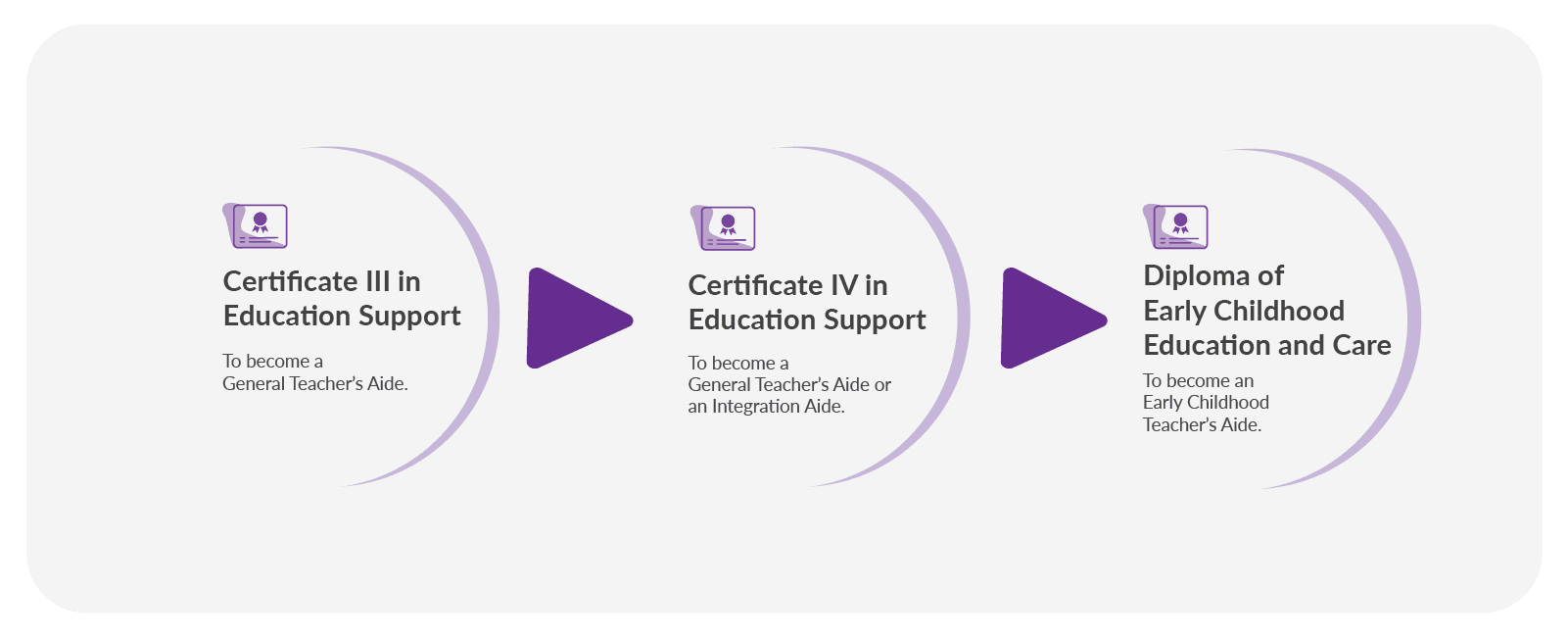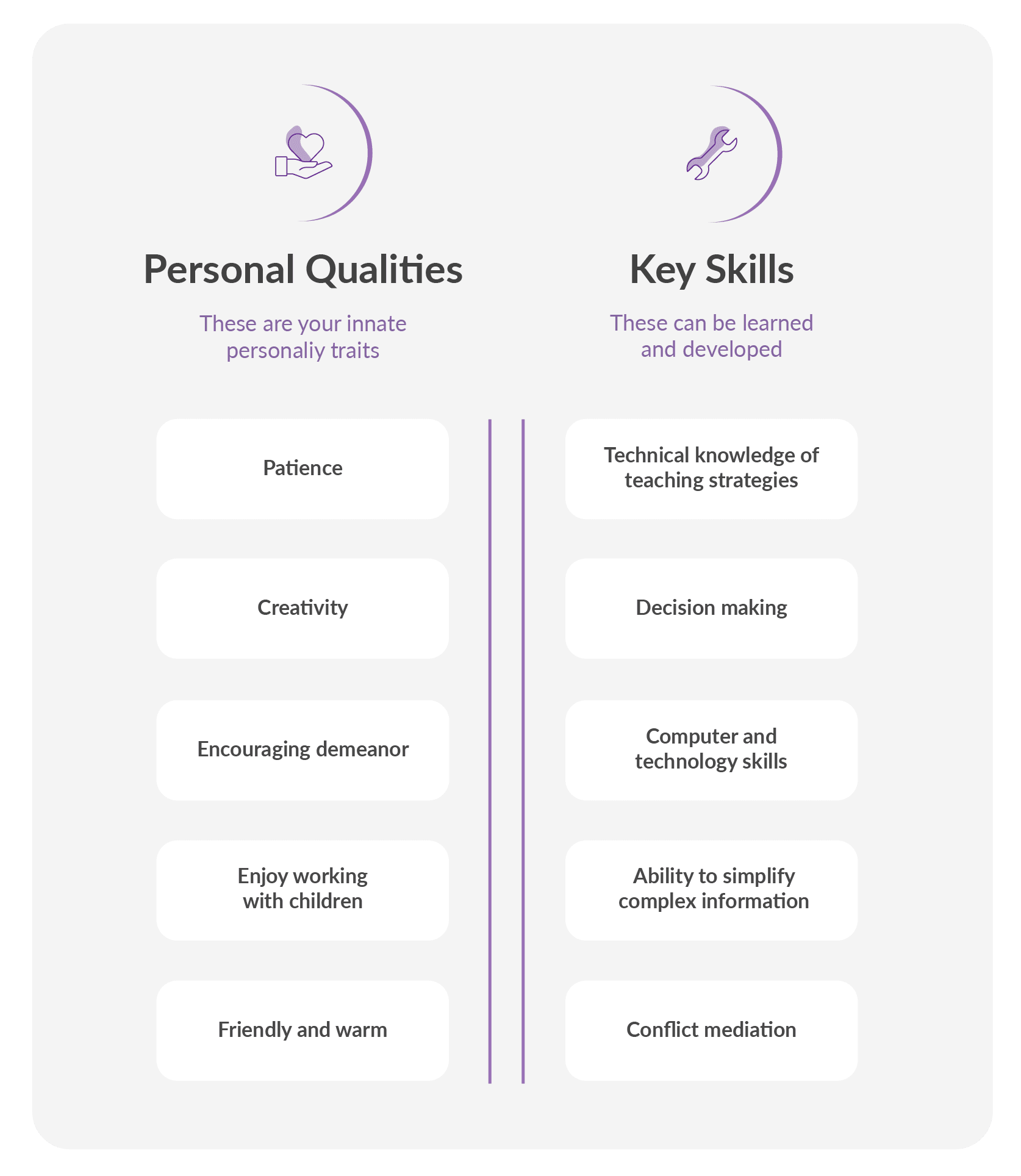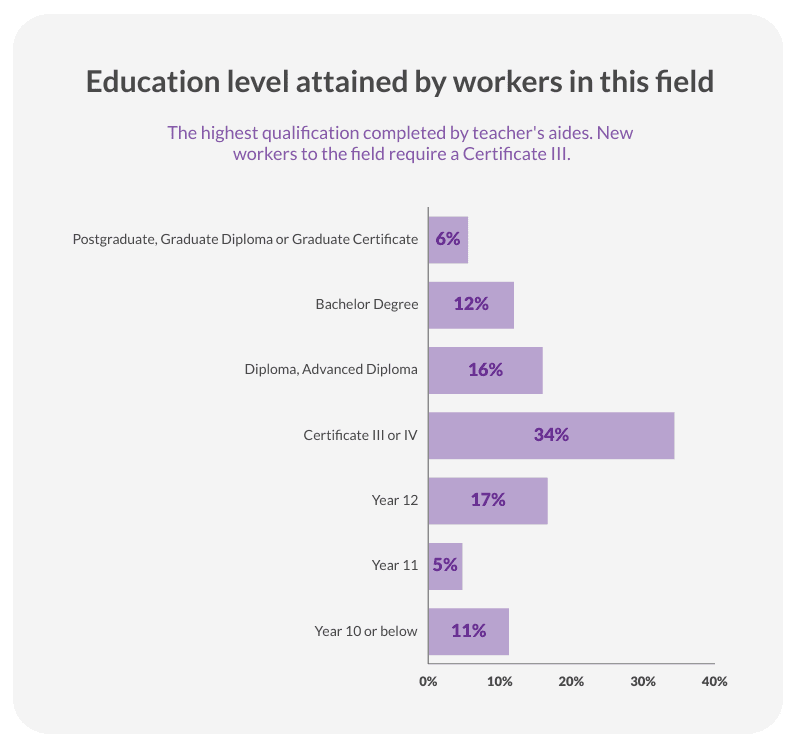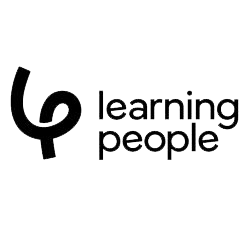In this post
Becoming a Teacher’s Aide: Everything You Need to Know

In this post Show
Working with children as a teacher’s aide is an incredibly rewarding experience. It’s a career where you have the opportunity to support the development of children during their education journey. You’ll be making a significant difference to your students as you help them through their school experience. And the teacher’s you work with will also find your support invaluable as you relieve some of their stress.
If you have the passion and dedication to light up the minds of the next generation of Australians, you’re already on your way to becoming a teacher’s aide.
Ready to discover the steps you can take to get qualified and start your career?
What is a teacher’s aide?
A teacher’s aide is a support role to a lead teacher within a school. They help teachers execute both in-class and out-of-class activities while providing support to individual students who may need extra help.
Teacher’s aides are not required to teach any of the classroom content, but rather help guide children to stay on task while helping to develop critical numeracy and literacy skills.
Furthermore, teacher’s aides help with the administrative side of teaching. This includes organising and preparing materials for a lesson, assisting with any necessary paperwork involved with lessons and reporting back to the teacher with any insights into a child’s progress.
How to become a teacher’s aide
Becoming a teacher’s aide will lead to an incredibly fulfilling career. Getting your foot in the door is a fairly straightforward process of four steps:
Decide on the type of teacher's aide you want to be
Decide on the type of role you’d like to have as a teacher’s aide, and what kind of school you’d ideally like to work at.
Get the right qualification
Get a teacher’s aide qualification that suits the role you’d like to be hired into. A qualification is absolutely essential in order to enter this field.
Gain practical work experience
Undertake work experience as a teacher’s aide to gain practical experience and on-the-job training under supervision. These vocational placements will be performed during your qualification.
Apply for teacher's aide jobs
Apply for a teacher’s aide role. Don’t be afraid to aim high, because your qualification, work experience and passion will make you stand out as a candidate.
1. Types of teacher’s aides you could become
There are different types of teacher’s aides that vary slightly in their focus or specialisation.
General teacher’s aide
This type of education support worker is generally hired by schools to help assist school teachers with the day-to-day running of a classroom. Often, they find themselves assigned to classes with children who have trouble concentrating, need extra help due to physical or intellectual special needs, or who have English as a second language.
As a general teacher’s aide, you can work with a range of ages from Prep to high school-aged. Those who prefer to work with older children may also look into youth work, as this career path provides support to children in a more informal education setting.
Integration aides
Integration aides are very similar to general teacher’s aides but have a more significant focus on children with special needs, such as those who may have any intellectual, social or physical issues.
Integration aides can work with a wide range of children from those who have Autism Spectrum Disorder, Down’s Syndrome or those who have unpredictable behavioural patterns. Depending on a school’s funding, these types of aides are required on a ‘needs basis’ for special education support.
Early childhood teacher’s aides
These types of teaching assistants work specifically with preschool aged children (generally five years and under), so enjoying working with young children is a must!
Preschool teacher’s aides assist with classroom activities such as story-time and art projects to ensure the lead teacher has time to complete any necessary paperwork and just generally have a break.
Preschool years are essential to a child’s educational and social development. Teacher’s aides play an important role in helping to uncover any children who may struggle with these things.
2. Teacher’s aide qualifications to get you a job
Choosing a qualification can be tricky, because there are a few education pathways available to become a teacher’s aide and each will qualify you to provide different levels of care. At a minimum you’ll need a Certificate III in Education Support to get your foot in the door, but there are a couple of other qualifications that can lead you down even more rewarding avenues.

Certificate III in Education Support
This is a great entry-level course where you’ll discover the basics of classroom-learning and how to work under the direct supervision of a teacher. Your learnings and skills development in this qualification will be centred around working effectively in a mainstream classroom.
This is a good qualification if you’re keen to start your career in a mainstream classroom as a general teacher’s aide.
Certificate IV in Education Support
In this qualification you’ll learn all the basics covered in the Cert III, with the addition of skills development for working with special needs students. This includes students with autism, physical disabilities, learning disorders and significant behavioural issues. This qualification is definitely favoured by schools, as most of the work teacher’s aides do is centred around helping students with special needs.
You’ll find this qualification will open a lot more doors for you. You’ll be able to work as an integration aide or a general teacher’s aide in a much wider range of schools, including special education schools.
Diploma of Early Childhood Education and Care
This qualification prepares you to work in a vast range of early childcare roles, including kindergarten assistant. You’ll learn the skills required to care for and support preschool-aged children (zero to six years old), and how to deliver education programs for children.
This qualification is crucial if your goal is to become an early childhood educator or assistant. You’ll be able to work in early childcare centres, like kindergartens.
When browsing courses, make sure you choose one that will qualify you in the state you want to work in.
It’s also a good idea to jump into some free online teacher’s aide courses to bulk up your resume and give yourself a wide berth of expertise. While you likely won’t get support in these free short courses like you will in a Certificate III or IV, they’re a great way to keep learning while you’re job hunting (even once you’re in the job).
It’s important to note that all education qualifications require a minimum amount of hours of Work Placement.
Work placement is hands-on practical experience at a formally recognised education provider. It’s essential everyone receives this experience because it allows you to put your theoretical knowledge into practice in a safe environment.
3. What does a teacher’s aide do? What to expect on your work placement
As a teacher’s aide, you’ll have a variety of broad, overarching responsibilities as part of your role. You’ll begin to learn about these in your teacher’s aide course, and will be able to put them into practice when you undertake your work placement.
Your responsibilities as a teacher’s aide include:
- Supporting students’ learning
- Assisting with student behaviour management
- Providing care and support to special needs students (if you have the necessary qualifications and skills)
- Helping with various admin, organisational and preparation tasks necessary for the smooth running of the classroom.
To fulfil these overarching responsibilities, you’ll likely be performing duties such as:
- Implementing teaching strategies like gamification and problem-based learning
- Building rapport with students
- Circulating the classroom to assist small groups or individual students
- Assisting students to develop social skills
- Distributing and collecting class-work
- Preparing work spaces for students (indoors and outdoors)
- Teaching students how to learn
- Developing a positive and harmonious relationship with the classroom teacher
As a teacher’s aide, it’s also important to know what not to do. While you’ll want to foster a fun, supportive learning environment, it’s crucial for your students that you avoid:
Being overly helpful
By doing everything for a student, always ‘rescuing’ them or giving them constant direct support, they’ll never have an opportunity to problem solve and make mistakes on their own. These are key parts of learning how to learn, and all students need to have these experiences to grow.
Over-correcting
It’s important for students to feel comfortable answering questions, whether they’re right or wrong.
Getting frustrated by poor behaviour
Whether you realise or not, there is always a reason behind poor behaviour. Try to read and understand it to help them overcome the issue causing them to act out.
Important teacher’s aide skills to hone

Personal qualities:
- Patience
- Creativity
- Encouraging demeanour
- Enjoy working with children
- Friendly and warm
Key skills:
- Technical knowledge of teaching strategies
- Decision-making
- Computer and technology skills
- Ability to simplify complex information
- Conflict mediation
4. Applying for jobs in this booming field
The future industry growth for education aides is projected to be very strong, with an estimated 17,000 job openings per year until 2023.
This is incredibly strong job growth, which is great news for when you start applying for jobs. You can be quite confident that the demand for teacher’s aides means it won’t be too hard to get accepted for job interviews. And once you’re in the interview, the only thing you need to focus on is impressing your prospective employer.
Some ways to prepare for the interview are by:
Researching the school you’ve applied to work at
What are their values, and how do you exemplify those in your personal and professional life? Try to memorise information about the school’s history to show your interviewer that you’ve done your research. Your research should also help you answer the common question: “Why do you want to work at this school?”
Talk up your strengths
You need to sell yourself as an employee, so prepare some examples of things you excel at as a teacher’s aide, and how you’ve demonstrated them in your work experience placement.
Be prepared for specific teacher’s aide questions
These could be anything from technical teaching theory, to what you would do in a difficult situation with students.
Some schools may also require you to perform a teaching demonstration as part of your application. While it might get your nerves going, take this opportunity to really demonstrate the strengths you spoke about in your interview. This is your best chance to leave a lasting impression on your interviewer.
An overview of the industry
Demand for education aides is highest in Queensland (27.3%), Victoria (22.2%) and New South Wales (21.7%).
A teacher’s aide often works part-time due to most schools hiring extra help on an ‘as needed-basis.’ Hence, many receive an hourly wage rather than a salary. The average hourly rate for a teacher’s aide is $29.97.
This industry is female-dominated with 90% of current workers being female.
JOB OPENINGS P/A
17,000
UNTIL 2023
TEACHER'S AIDES AVERAGE
$29.97
HOURLY PAY
This career path is an excellent choice for those who are looking to return to the workforce or change career paths, as the majority of workers fall into the 45-54 years age bracket (34.1%), with a close 25.6% falling in the 35-44 age bracket.
34.3% of teaching assistants acquire a Certificate III or IV in Education, while another 15.9% will progress to complete a Diploma or Advanced Diploma. Only 11.6% of teacher’s aides hold Bachelor’s Degrees.
Many aides who proceed to complete a Bachelor’s degree tend to specialise in working with children with disabilities or wish to become a fully qualified teacher.

Teacher’s aides are critical to the Australian education system. It’s these individuals who support our teachers and children who may need extra attention throughout their education journey.
If you’re good with kids, have excellent social skills and are patient, becoming a teaching assistant is the right career move for you!
Browse Education Results
Certificate III in Individual Support (Ageing and Disability) CHC33021
Are you passionate about a career in caring for others, both in the aged care and disability sectors? The CHC33021 Certificate III in Individual Support (Ageing and Disability) is your gateway to becoming a skilled Care Worker in these vital fields. As...
Systems Security Certified Practitioner (SSCP)
Why choose the Systems Security Certified Practitioner (SSCP)? The SSCP certification is recognised internationally as a benchmark for IT security expertise and is designed to validate the knowledge and skills necessary to implement, monitor and admini...
Project Management Professional – PMP
Why choose the Project Management Professional – PMP? The Project Management Professional Course is an in-depth course that enables project professionals to significantly improve their understanding of the intricacies and challenges of Project Manageme...
PRINCE2® Practitioner
Why choose the PRINCE2® Practitioner? If you’re looking to build on your foundational understanding of PRINCE2® Project Management methodology then this course is for you. PRINCE2® (Projects IN Controlled Environments) is a globally recognised framewor...
PRINCE2® Pathway
Why choose the PRINCE2® Pathway? PRINCE2® is a globally recognised project management methodology, and its adaptability lets you manage projects of all sizes, using industry best practice. Passing the PRINCE2® Foundation certification demonstrates your...
PRINCE2® Foundation
Why choose the PRINCE2® Foundation? PRINCE2® is the global standard for project management, and this certificate gets you well on the way to a rewarding and lucrative role as a project manager. The course will give you a clear understanding of the PRIN...
PRINCE2® Agile Practitioner
Why choose the PRINCE2® Agile Practitioner? PRINCE2® is a globally recognised project management methodology, and its adaptability lets you manage projects of all sizes, using industry best practice. The PRINCE2® Agile Practitioner course is an extensi...
PMP Pathway
Why choose the PMP Pathway? Providing a senior level training in Project Management, plus the foundations of Scrum and Agile. Our PMP Pathway elevates your expertise in Project Management and widen your skill sets too. By completing this pathway, you’l...
PMP and Change Pathway
Why choose the PMP Pathway? Providing a senior level training in Project Management, plus the foundations of Scrum and Agile. Our PMP Pathway elevates your expertise in Project Management and widen your skill sets too. By completing this pathway, you’l...
PMI Agile Certified Practitioner (ACP)
Why choose the PMI ACP? The PMI Agile Certified Practitioner (ACP) course is a professional certification which works to enhance your ability to bring agility and self-sufficiency in project management. Agile projects involve self-empowered teams that...
Networking Career Starter Pathway
Why choose the Networking Career Starter Pathway? Our Networking Career Starter Pathway helps you to efficiently launch or advance your IT networking career. Covering the fundamentals of computing, networking, security, routing, and switching, each ste...
Microsoft Certified: Azure Solutions Architect Expert
Why choose the Azure Solutions Architect Expert? The Microsoft Certified: Azure Solutions Architect Expert course elevates your expertise in designing and implementing Azure solutions. The course teaches you to craft solutions tailored to specific busi...
Microsoft Certified: Azure Fundamentals AZ-900
Why choose the Microsoft Certified: Azure Fundamentals AZ-900? The Microsoft Certified: Azure Fundamentals AZ-900 certification is an entry-level qualification offered by Microsoft. Microsoft Azure is utilised globally, enabling companies to build, dep...
Microsoft Certified: Azure Developer Associate AZ-203
This course is for those with some experience in using Microsoft Azure looking to boost their career in this area. This certification is for someone with some experience working with Azure and the cloud looking to follow a cloud developer career pathwa...
Java Novice to Javanista
Why choose the Java Novice to Javanista? Java is a popular and versatile programming language that is used worldwide. It helps aspiring developers gain the skills and knowledge necessary to create applications, games, and tools in Java. This course wil...
ITIL®4 Drive Stakeholder Value (DSV)
Why choose the ITIL®4 Drive Stakeholder Value (DSV)? ITIL® 4 is the latest iteration of the widely adopted IT service management framework. By becoming certified in ITIL® Drive Stakeholder Value (DSV), you stay current with the latest best practices an...
ITIL® v4 Foundation
Why choose the ITIL® v4 Foundation? If you have an interest in building your understanding of IT applications in business strategy, then the ITIL® v4 Foundation is the course for you. During this entry-level course, you will become familiar with ITIL®...
ITIL® 4 High Velocity IT (HVIT)
Why choose the ITIL® 4 High Velocity IT (HVIT)? Stay ahead with ITIL® 4, the latest IT service management framework. Obtain the ITIL®4 High Velocity IT (HVIT) certification to drive change, align governance and strategy, and encourage collaboration for...
ITIL® 4 Direct Plan and Improve (DPI)
Why choose the ITIL® 4 Direct Plan and Improve (DPI)? The ITIL® 4 Direct Plan and Improve (DPI) enables professionals to align governance and strategy with service management activities, encourage a culture of collaboration and continual improvement, a...
ITIL® 4 Digital and IT Strategy (DITS)
Why choose the ITIL® 4 Digital and IT Strategy (DITS)? The ITIL® 4 Digital and IT Strategy (DITS) certification provides you with the necessary skills to lead the development and management of IT products. Black Friday Offers Available! Save on tuition...
Online courses also available
Latest Articles
How to Apply for Work Placement: Tips & Resources
Congratulations! You’re about to embark on an exciting journey where you will practise and develop t...
11 Hobbies That Can Make You Money: Use Your Passion for Profit
Hobbies often get a bad rap. They’re seen as just a way to kill time, a mindless escape from t...
Is The Job You Hate Killing You? Why You Need to Make a Change
Do you hate your job? Studies show that staying in a job you hate has negative health effects and ev...
Want to read more?
How to Become a Software Developer
Do you want to become a customer service assistant? We unpack the skills, qualifications and experie...
Going Back to Work After a Long Break: Navigating the Transition
Returning to work after an extended break can be as exhilarating as it is intimidating. Whether your...
How to Become a Translator
Do you have strong language skills? Work with your mother tongue and another language as a professio...



